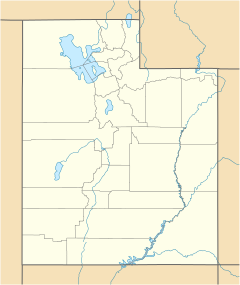Snowbird, Utah
| Snowbird | |
|---|---|

One of two cable cars composing the Aerial Tram at Snowbird Ski and Summer Resort approaches the top station on top of Hidden Peak at an elevation of 11,000 feet
|
|
|
Location of Snowbird, east of Sandy
|
|
| Location |
Wasatch National Forest Little Cottonwood Canyon Salt Lake County, Utah |
| Nearest city |
Sandy: 4 miles (6 km) Salt Lake City: 29 mi (47 km) |
| Coordinates | 40°34′52″N 111°39′23″W / 40.58111°N 111.65639°WCoordinates: 40°34′52″N 111°39′23″W / 40.58111°N 111.65639°W |
| Vertical | 3,240 ft (988 m) |
| Top elevation | 11,000 ft (3,353 m) |
| Base elevation | 7,760 ft (2,365 m) lowest chairlift 8,100 feet (2,469 m) main base area |
| Skiable area | 2,500 acres (10.1 km2) |
| Runs | 169 |
| Longest run | 2.5 miles (4.0 km) Chip's Run |
| Lift system | 13 lifts: 1 tram 6 hi-speed quad chairs 4 double chairs 2 surface lifts |
| Lift capacity | 17,400 per hour |
| Terrain parks | 1 |
| Snowfall | 500 in (1,270 cm), average record: 783 in (1,990 cm), (2011) |
| Night skiing | limited |
| Website | www |
Snowbird is an unincorporated community in Little Cottonwood Canyon in the Wasatch Range of the Rocky Mountains near Salt Lake County, Utah, U.S. It is most famous for Snowbird Ski and Summer Resort, an alpine skiing and snowboarding area, which opened in December 1971.
The development of Little Cottonwood Canyon and the town of Alta dates to the 19th Century. A U.S. Army soldier first prospected for silver there in 1869. Mining became a large local industry, and Little Cottonwood Canyon became one of the largest producers of silver ore in the Wasatch Mountains. Known as the Emma Mine (the origin of the name of the Big Emma ski run in Snowbird's Gad Valley), the soldier's find eventually produced more than $3.8 million in silver. At its peak, 8,000 people lived and worked in the narrow canyon, which held two smelters, 138 homes, hotels, boarding houses, stores and a railroad. The entire town was later destroyed by a series of avalanches.
The resort is a multi-facility winter and summer (primarily winter) resort. Primarily known for its winter powder skiing and snowboarding, during other seasons Snowbird also hosts hikers, mountain bikers, fishermen, and other mountain vacationers. The facilities include ski lifts, hotels, condominiums, spa facilities, restaurants, other resort-related retail businesses, and medical services.
The resort operates almost entirely on National Forest Service land – the resort owners only have ownership rights to a relatively small part of it.
The originator of the Snowbird resort concept was Ted Johnson, who had managed the Alta Lodge in the town of Alta at the head of Little Cottonwood Canyon for about a decade. He had explored the terrain below Alta in the Peruvian Gulch and Emma Mine/Gad Valley watersheds that later became Snowbird. Johnson met Dick Bass, a Texas oilman, in 1969, and the two of them partnered to create the Snowbird resort, which opened in 1971. In 1974, Johnson sold his interest in Snowbird to Bass.
...
Wikipedia

